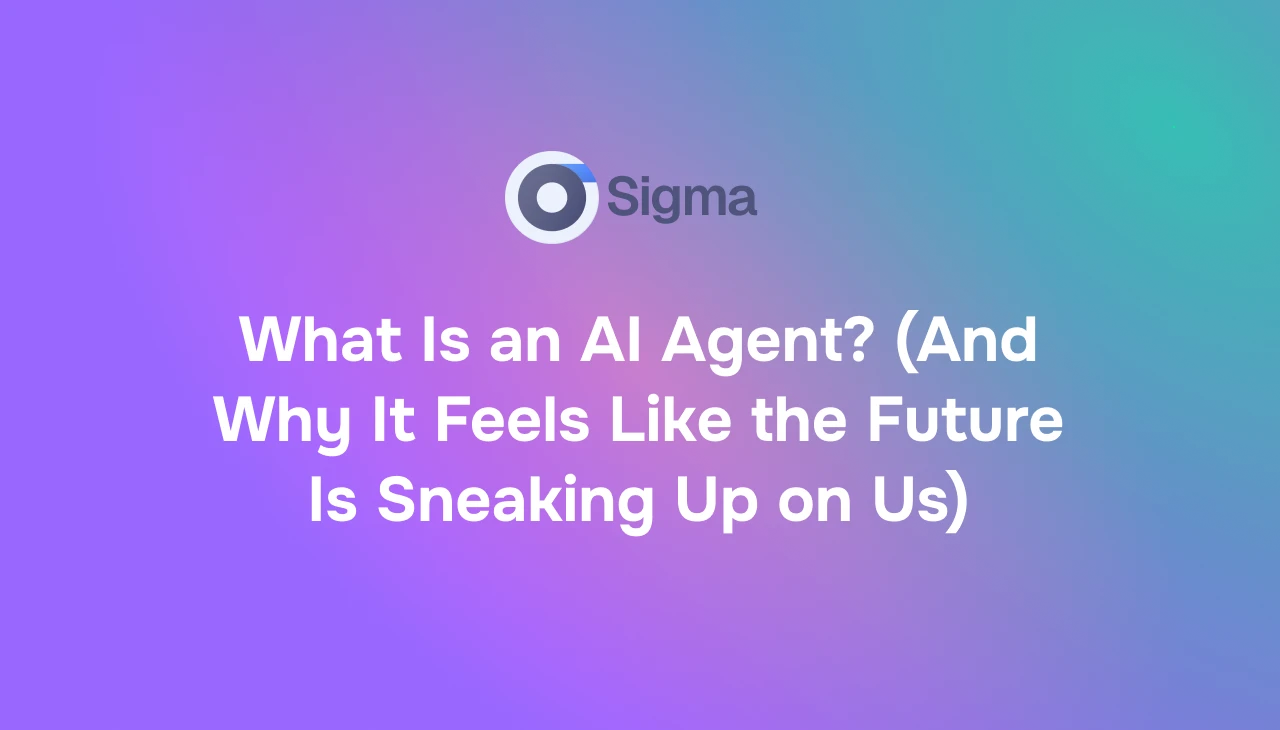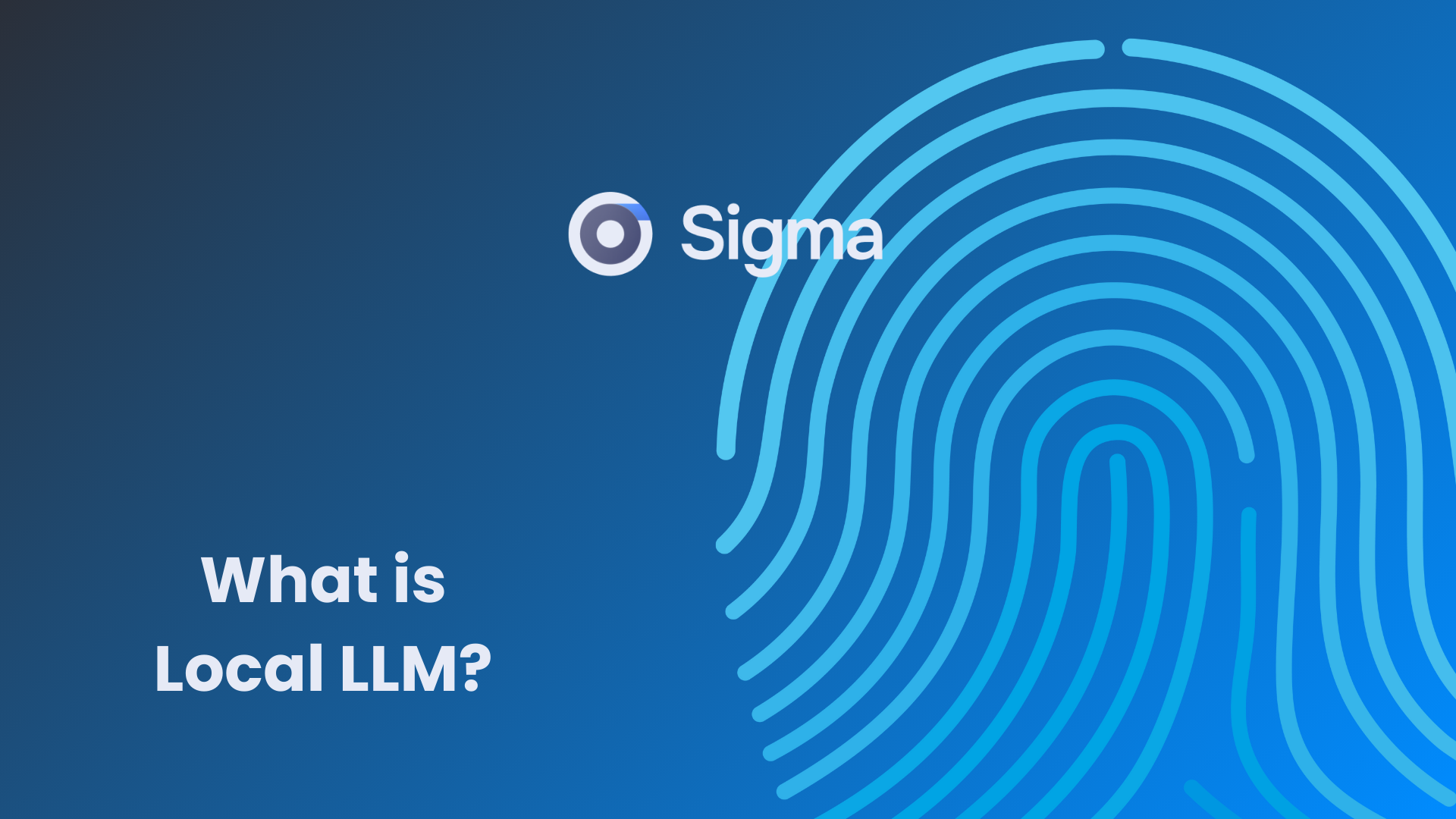What Is an AI Agent? (And Why It Feels Like the Future Is Sneaking Up on Us)
Let’s just admit it: the phrase “AI agent” gets thrown around so casually that half the time, people don’t even know what they’re talking about. It’s the new “cloud computing” circa 2010 — everybody’s nodding along, pretending they understand, while secretly Googling later.
And here’s why we care: at Sigma Browser, we’ve been obsessing over this shift for months. Because the browser is where most of us basically live online, it’s also the perfect home for an AI agent — not bolted on as an extension, but built right in at the core. That’s what we’re working on: a browser with a native AI agent that can actually help you do things while you browse, not just answer questions. It’s coming soon, and honestly, it’s the reason I’m even writing this piece.
But before we jump too far ahead, let’s get clear on what an AI agent actually is.
First Things First: The Textbook Definition (With a Twist)
An AI agent is, in the driest academic sense, a system that perceives its environment, reasons about it, and then takes action toward some goal.
Sounds neat. A little vague. Kinda boring.
But in plain English? Imagine software that doesn’t just respond when you poke it, but actually does things on its own. Not “sentient robot with an attitude” (we’re not there, calm down) — more like an intern who’s unusually fast, doesn’t need sleep, and keeps trying new ways to get better at the job.
That’s the heart of an agent: perception, decision-making, and action.
Quick Snapshot: What AI Agents Bring to the Table
Sometimes it helps to step back and look at the big picture. Here’s a simple overview:
Think of this table less as “definitions” and more like a cheat sheet for spotting when software is behaving like an agent versus just another static tool.
Where the Idea Even Came From (Spoiler: Not Yesterday)
AI agents aren’t some shiny new invention cooked up last week. The idea has roots in classic computer science and even philosophy. Early work in the 80s and 90s talked about “intelligent agents” in robotics and distributed systems — little software entities that could sense their environment and make autonomous choices.
Think of it like this: before LLMs, AI was mostly about hard-coded rules and problem solvers. Agents were the dream of making those systems less rigid, more… alive.
Fast forward to today, and with language models, APIs everywhere, and absurd amounts of compute power, that dream is suddenly practical.
The Four “Kinds” of AI Agents (Roughly… Because Categories Always Leak)
Researchers love to classify things, and AI agents are no exception. Here’s the cheat sheet:
- Reactive agents – They don’t remember the past. They just respond to stimuli. Imagine a thermostat, or, yes, your Roomba bumping into walls.
- Deliberative agents – The planners. They use models, maps, and strategies to decide what to do. Smarter, but slower.
- Hybrid agents – Because reality is messy, and nobody sticks to just one strategy. These combine reactivity with planning.
- Learning agents – The exciting (and slightly terrifying) ones. They adapt. They evolve. They don’t just follow fixed rules, they get better over time.
Of course, modern AI systems are usually some Frankenstein combo of these. And that’s a good thing.
Why You’re Hearing “AI Agent” Everywhere Right Now
Honestly? Because life online is overwhelming.
We live in browsers. We juggle a dozen SaaS platforms, countless apps, endless notifications. It’s too much for a single human brain (mine included). That’s where AI agents slide in — not just as chatbots answering questions, but as actual digital co-workers.
Picture this: you don’t just Google “flights to Barcelona.” Your agent checks your calendar, knows you hate layovers, finds tickets, books them, and pings your group chat with the itinerary. All while you were busy doomscrolling something else.
That shift — from passive tool to active participant — is why agents feel like the next big leap.
And yes, this is why we at Sigma Browser are building a browser with a built-in AI agent. No clunky extensions. No bolt-ons. A native agent that actually gets your workflow, right where you live online. We’re almost there.
The Ugly Truth: They’re Not Perfect (Yet)
I’d love to tell you AI agents are flawless, but… lol. No.
They screw up. Sometimes spectacularly. They burn through resources chasing bad leads, misinterpret instructions, or decide that “book me a flight” means “buy 5 random tickets because why not.”
They also raise awkward questions:
- Who’s responsible when an agent makes a costly mistake?
- Where does your data go when the agent is “helping” you across platforms?
- At what point does “autonomy” start feeling like “loss of control”?
Real-World Examples (That Don’t Sound Like Sci-Fi)
- Customer support: Agents that don’t just answer FAQs but actually resolve issues end-to-end.
- Personal productivity: Agents that schedule, draft, organize, and follow up (without needing five apps duct-taped together).
- Research assistants: Imagine delegating a week-long literature review to an AI that reads, summarizes, and cross-links everything for you.
- Creative tools: Agents that suggest edits, generate drafts, or even test new designs in the background.
Some of this is already live. Some is still experimental. But all of it points in one direction: less grunt work for humans.
The Future (Brace Yourself)
Here’s where things get really wild. AI agents aren’t going to stay small. Imagine entire swarms of them, coordinating across networks, running simulations, negotiating deals, managing supply chains. Not just one agent per person, but ecosystems of agents working together.
And yeah, that sounds both thrilling and a little scary. But so did the internet in the 90s.
The real challenge won’t be whether we can build them (we can, and we are). It’ll be figuring out how much freedom to give them, and how much oversight to keep.
Final Thought (Before This Turns Into a Book)
AI agents are not magic. They’re systems. But they represent a fundamental shift: software that doesn’t just sit there waiting for instructions, but gets up, looks around, and takes initiative.
Sometimes they’ll amaze us, sometimes they’ll frustrate us, but they’re not going away. And soon, they won’t be tucked away in obscure research demos — they’ll be right in the browser tabs you already live in.
Keep your eyes open. The future’s knocking, and it’s calling itself an “agent.”







.png)







